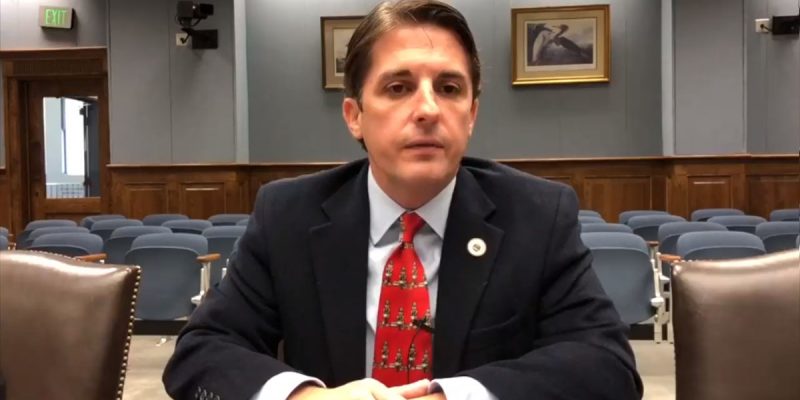State Representative Cameron Henry (R-Metairie) is out with a new installment of his periodic Facebook video diaries, and this one is an interesting look into where Louisiana’s Republican legislators are in relation to Gov. John Bel Edwards as 2017 melts into 2018.
Henry discusses three topics in the video below – the looming budget battle as the governor is days away from calling a special session to address Louisiana’s fiscal cliff, the controversy over Medicaid contracts Edwards unilaterally, and possibly illegally, approved over legislators’ objections and the fallout over the implementation of the criminal justice reform package passed earlier this year.
On the budget, Henry says he thinks Edwards might embrace the House’s concept of a “standstill budget” of last year, a plan which he fought in the regular session and managed to drag the House off its position in a second special session after the regular session. But Edwards, who we’re told essentially crashed a meeting of the House Republican delegation last week and gave a speech some described as browbeating, is singing the same tune he’s always sung – namely, that if Republicans don’t like his tax increases then they’re obligated to present him with recommended budget cuts. This is a tactic many Louisiana governors have used through the years and it’s a fraud – the legislators have never had access to the kind of detailed budget information necessary to find the real fat in the budget, and the one governor who actually did make some budget cuts was accused by Edwards and his party of “destroying” the state.
Meaning that there is little reason to believe this coming year will be any different than this passing year where it comes to Edwards’ relationship with the House on the budget, and another attempt at a coup to remove House Speaker Taylor Barras is still quite possible even though Edwards lost his best possible choice to replace Barras when Chris Broadwater resigned from the House on Friday.
Edwards’ specific recommendations indicate that his agenda will be more or less dead on arrival in the House. Among them…
Advertisement
-Increase the individual income tax for those who itemize on their personal income-tax forms, by cutting in half the percentage of federal excess itemized deductions they can deduct; and change the brackets for calculating the individual income tax, boosting taxes on middle- and upper-income earners. The combined proposals are estimated to raise about $500 million a year.
-Continue to charge businesses higher sales taxes for utilities and remove more than 180 sales tax breaks on the books, to generate about $300 million a year.
-Newly charge state sales taxes on some services such as cable television and streaming services, debt collection services and repair services, to raise about $200 million a year.
-Continue reductions made in 2015 to tax-break programs that largely assist businesses, to generate about $60 million annually.
-Allow a 1 percent temporary state sales tax enacted in 2016 that raises about $900 million a year to expire. Edwards, however, said he’d allow a short-term renewal of the tax “as a bridge” until other tax types approved by lawmakers start bringing in revenue for the state.
The temporary renewal of the sales tax is probably the only thing in that mix which has a chance to pass; with the worst-performing state economy in the country it’s a non-starter for the governor to propose any further business tax hikes, and nobody is going to vote for a middle class tax increase like the itemized deductions and revised tax brackets would entail. That means his agenda will be dead on arrival and he’ll demand the House come up with budget cuts that he will parade his cabinet out to decry as killing kids and old people.
Just like last year.
Henry clearly has the Christmas spirit, though, so he’s projecting optimism on the budget.
On the Medicaid contracts, he’s less specific, though he notes those contracts with third-party vendors constitute some $15 billion in state spending, much of it going out of state. As we’ve noted, this is going to be an item of major significance going forward and might end up in court as a test of the governor’s power vis-a-vis the legislature.
Henry also touches on the Smokey White case and the growing list of examples in which career criminals are being discharged from the state’s jails as part of the criminal justice reform package; we’ve noted the political problem this has created for Edwards and Henry picks up on it expertly, noting the long-running flaw in the governor’s approach that the releases are being made in order to drive a number rather than to actually solve the problem of overincarceration. Other states which have been successful with criminal justice reform have invested in things like job training and support infrastructure in order to put ex-convicts on a path to productive lives outside of prison, and focused on that aspect of reform, while Edwards seems more interested in simply letting as many people out of jail as he can so that Louisiana can have an incarceration rate which is less than Mississippi and no longer leads the world in the percentage of its people in jail. Overincarceration is certainly a problem to be addressed, but most Louisianans would say crime on our streets is a larger one. Henry’s position, that what Edwards is doing is irresponsible, is one which will only develop roots with the majority of the state’s voters – that will be doubly true when the next Smokey White turns out to have killed someone.
Advertisement
Advertisement

